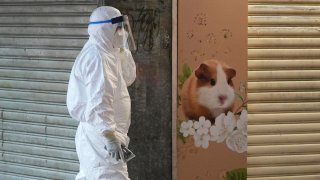
Hong Kong authorities said Tuesday that they will kill about 2,000 small animals, including hamsters, after several tested positive for the coronavirus at a pet store where an employee was also infected.
The city will also stop the sale of hamsters and the import of small mammals, according to officials from the Agriculture, Fisheries and Conservation Department. The pet shop employee tested positive for the delta variant on Monday, and several hamsters imported from the Netherlands at the store tested positive as well.
According to the U.S. Centers for Disease Control and Prevention, animals do not appear to play a significant role in spreading the coronavirus. But Hong Kong authorities said they are not ruling out transmission between animals and humans.
“We cannot exclude the possibility that the shopkeeper was in fact actually infected from the hamsters,” said Edwin Tsui, a controller at the Centre for Health Protection.
Get top local stories in Philly delivered to you every morning. >Sign up for NBC Philadelphia's News Headlines newsletter.
While this coronavirus most likely jumped from animals to humans in the first place, the outbreak became a pandemic because the virus spreads so easily between people. Minks are the only known animals to have caught the virus from people and spread it back, according to Dr. Scott Weese at Ontario Veterinary College.
Leung Siu-fai, director of the Agriculture, Fisheries and Conservation Department, said during a news conference that owners should keep hamsters at home, and not take them out. “All pet owners should observe good personal hygiene, and after you have been in contact with animals and their food, you should wash your hands," he said.
“Do not kiss your pets,” he added.
U.S. & World
Stories that affect your life across the U.S. and around the world.
Customers who purchased hamsters from the store after Jan. 7 will be traced and be subject to mandatory quarantine and must hand over their hamsters to authorities to be put down, officials said.
They said all pet stores in Hong Kong must stop selling hamsters and that about 2,000 small mammals, including hamsters and chinchillas, will be killed in a humane manner.
Customers who bought hamsters in Hong Kong from Dec. 22 will be subject to mandatory testing and are urged not contact others until their tests have returned negative. If their hamsters test positive, they will be subject to quarantine.
Hong Kong's Society for the Prevention of Cruelty to Animals said it was “shocked and concerned” by the decision to kill the animals, and urged the government not to “take any drastic action before reviewing its approach."
Hong Kong has been grappling with a local omicron outbreak traced to several Cathay Pacific crew members who dined at bars and restaurants across the city before testing positive for the omicron variant.
The government announced late Monday that two former flight attendants have been arrested for leaving their homes during quarantine and later being confirmed to have coronavirus infections. It did not identify their employer, but said the two arrived from the U.S. on Dec. 24 and 25 and “conducted unnecessary activities” while under medical surveillance.
The arrests came after Cathay Pacific said it had fired two crew members for breaching coronavirus protocols. It previously apologized and called their actions “extremely disappointing.” The company had to cut back on flights — both passenger and cargo — in January because of tightened virus curbs.
The two have been released on bail and will have their case heard in court on Feb. 9. If convicted of violating anti-epidemic regulations, they could face up to six months' imprisonment and a fine of up to 5,000 Hong Kong dollars ($642).
Previously in Hong Kong, some air and sea crew members could isolate at home under quarantine exemptions. Regulations were tightened on Dec. 31 to require crew members to isolate in a designated quarantine hotel for about a week.
___
This story has been corrected to say 2,000 small animals will be killed, including hamsters. A previous version of this story incorrectly stated that 2,000 hamsters will be killed.



